|


Best viewed using


buy, Philip
phone, card, cards,
phonecard, phonecards, sell, sale, sales, cheapest, call, free, hello, asia,
disabled, wheelchair, help, hearing, deaf, Villahermosa, Cebu, Talisay, Lawa-an,
Philippines, Tabunok, support, impaired, Michael, Lorena, St., Saint, Louis,
Missouri, charity, non, for, profit, Filipna, Filipno, deaf, school, philippine,
schools, children, kid, kids, adults, schooling, supplies, philippine deaf,
philippine school, deaf school, donate, used, hearing, aid, aids, fund, loss,
donation, donations, Filipino, PI, Cebu, help, children, kids, impaired,
disabled, hear, sign language, PI, disability, help, helping, community,
impaired, give
| |
Tour Cebu, Philippines...
|
 |
| "The Queen City of the South"
Cebu (Sugbo) is the name given to the city, the
metropolis, the island, the province.
Cebu Province is made up of
48 municipalities and 5 cities - Cebu, Danao,
Lapu-lapu, Mandaue and Toledo - with Cebu City as
its capital. Cebu Island is a sliver of an island
centrally located in the Visayas region of the
Philippine archipelago, 365 miles south of Manila.
Metropolitan Cebu is a complex of 3 cities and 6
municipalities with a population of over 1
million. Cebu City is the oldest Philippine city,
and is also called the "Queen City of the
South". As the first Spanish settlement, it
was called Ciudad del Santissimo Nombre de Jesus.
Cebu City... It is the Philippines' oldest city and carries some of the country's most
priceless historical relics and monuments. The Magellan Monument marks where the Spanish discoverer was killed, and the Lapu-Lapu Monument commemorates the man who
slain him --and ho many call the first Filipino hero.
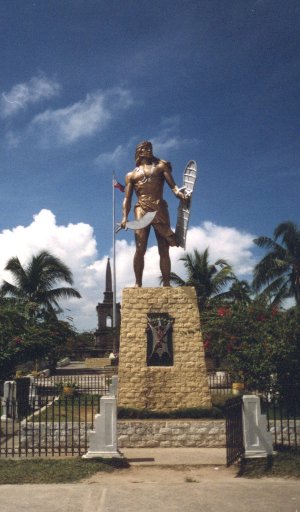
You can also see the emblems that Magellan left to commemorate the Filipino's conversion to Christianity: Magellan's Cross, and the country's oldest religious relic,
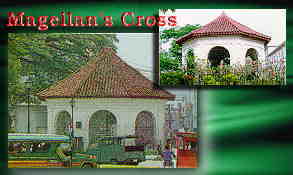
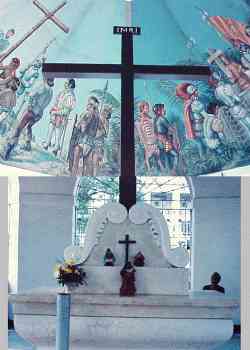
the Image of the Holy Child Jesus. 
The Image now lies in the Basilica of the
Sto. Nino, and is recognized by the Vatican as the cradle of Christianity in Asia. The
wooden cross which Magellan brought with him in
the year 1521 when he first set foot in the
Philippines at a place called Sugbu, now Cebu, has
been preserved and is now encased in an outer
layer of tindalo wood, mounted on a concrete
pedestal, and housed in a tile-roofed kiosk. At
the roof of the kiosk is a painting depicting the
landing of Magellan in Cebu and the planting of
the original cross on the shore.
To Christian Filipinos, this cross symbolizes the
victory of Jesus Christ in the Far East,
particularly in the Philippines.
Santo Nino, is
with Magellan’s Cross, the most popular symbol
of Cebu. Expressive of the pleasing oppositions in
Cebuano culture, it is at once both foreign and
native. In history, it was made by Flemish
artisans, brought to the island by Ferdinand
Magellan in 1521. In local tradition, it is a
miraculous piece of wood, cast out of the Visayan
sea, worshipped from “times immemorial”.
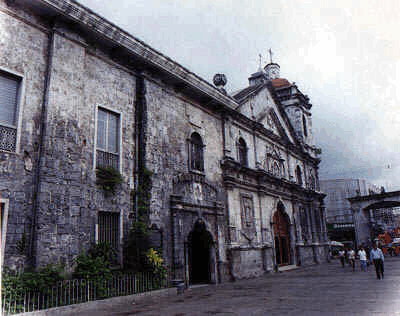
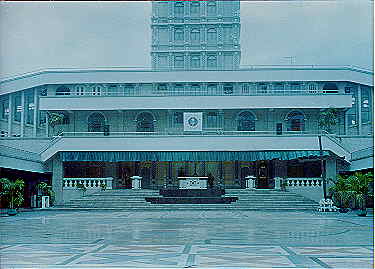 BASILICA
MINOR DEL SANTO NIÑO
–
This
church was built by Miguel Lopez de Legaspi and
Fr. Andres Urdaneta on the site where the image of
Santo Niño was found in 1565. The first structure
of the church was, however, destroyed by fire on
November 1, 1568. It was rebuilt in 1602 under the
administration of Juan Albaran and was
rehabilitated in 1740. On May 1965, the church was
conferred the title of Basilica Minor del Santo Niño
Antonuitte, Papal Legate during the Fourth
Centennial celebration of the Christianization of
Cebu.Another famous church is the Chapel of the Last Supper, which has life-sized, hand-carved statues of Jesus and his disciples dating back to very early parts during the Spanish occupation.
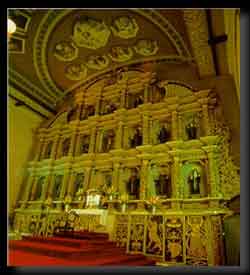
Aside from the
relics, Cebu's rich historical roots is resplendent in its architecture. Fort San Pedro was built by the Spaniards in the 1700s to repel the Muslim rebels, and the
Osmena Residence houses not only the personal memorabilia of the country's first president but mementos from General Douglas Mc Arthur.
FORT
SAN PEDRO NATIONAL COLISEUM
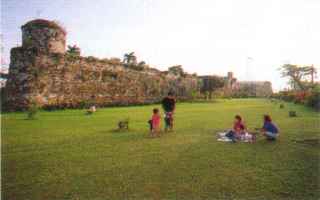
Legaspi
Ext., Cebu City- Artifacts taken from the old Spanish Galleon known as SAN DIEGO within the deep
sea of Fortune Island off the coast of Nasugbo,
Batangas are on display in this centuries-old
Fort. The museum used to house the offices of the
Department of Tourism and the Philippine Tourism
Authority.
|
|  |
|  | |
|
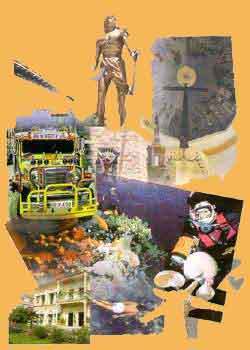
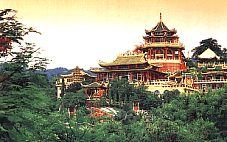
TAOIST
TEMPLE
Located
at Beverly Hills, Cebu City. This
temple preserves the teachings of
Lao-Tse, the 600 B.C. Chinese
philosopher. Everyday people climb
its 99 steps to light joss sticks
and have their fortune read.
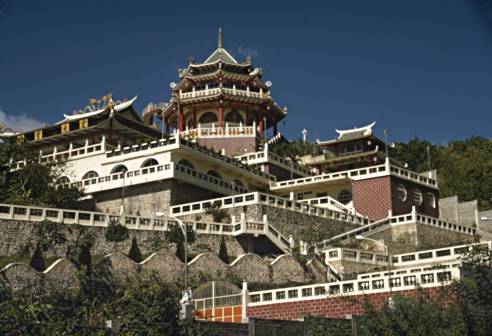
A towering,
multi-tiered, multi-hued
attraction accessible by three
separate winding routes.
Attractions here consist of huge,
colorful dragon, a replica of the
Great Wall of China, spacious
balconies offering scenic views,
souvenir shops, mini library with
instructional materials, and
dozens of escalating steps.
Chinesischer
Tempel, Taoist Temple
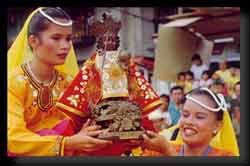
Bahug-Bahugan-Festiva
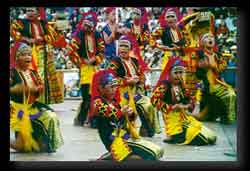
Sinulog Festival
Every
third Sunday in January starts the Sinulog
Festival coincides
with the feast of the Santo Niño
de Cebu, patron saint of the
city of Cebu. The feast day of
the Santo Niño
commemorates the baptism of the
chieftain of the province, his
queen, and his subjects in 1521.
At this ceremony, an image of the Santo
Niño was presented as a gift
to Queen Juana by the explorer
Ferdinand Magellan. |
|
|
|  | |
 |
|
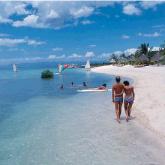
|
|
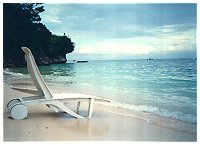
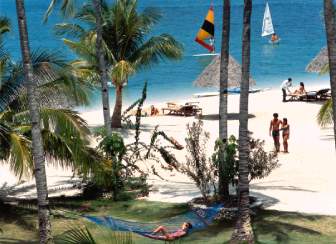
Cebu City is also known for being a commercial center, second only to Manila. Even before the Spanish arrived it had traded with the East Indies, Siam and China. Today, tourists still flock to buy the locally handcrafted instruments, particularly the guitars, string basses and
mandolins
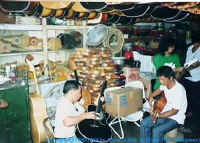
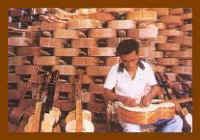
Cebu! View from the hills...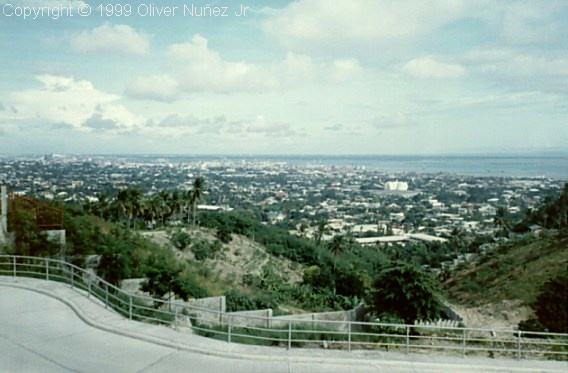 |
|
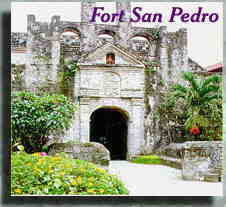
The artifacts on display include
Ming porcelain pieces of all sizes, coins,
lockets, swords fragments, cannons and helmets.
Well-kept flower beds, cannons, lush vegetation,
and neat walkways align its interiors along with a
canteen and a museum.

|
|

|
|